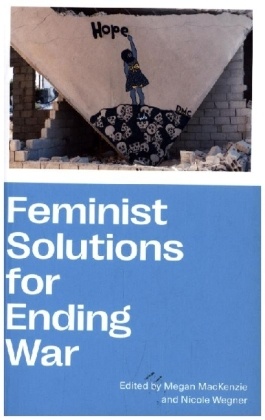| Verlag | Pluto Press |
| Auflage | 2021 |
| Seiten | 256 |
| Format | 13,9 x 2,0 x 21,8 cm |
| Paperback | |
| Gewicht | 273 g |
| Artikeltyp | Englisches Buch |
| EAN | 9780745342863 |
| Bestell-Nr | 74534286EA |
Will war ever end? Women across the world are proving that they can oppose patriarchal capitalist violence
All wars are started by men, so goes the saying. Whether this is true or not, patriarchal capitalism is certainly the driving force behind war in the modern era. So can we end war with feminism? This book argues that this is possible, and is in fact already happening.Each chapter provides a solution to war using innovative examples of how feminist and queer theory and practice can inform pacifist treaties, movements and methods, from the international to the domestic spheres. Including chapters on how the Treaty on the Prohibition of Nuclear Weapons is informed by feminist theory, how indigenous feminism provides the key to reimagining peace, the disruptive aesthetics of North Korean womens art, the link between male domestic violence and mass violence, rethinking the queer definition of security, and many more aspects.By thinking beyond the violence of the capitalist patriarchy, this book makes the powerful case that the possibility of life without war is real.
Inhaltsverzeichnis:
Introduction - Megan MacKenzie & Nicole Wegner1. Giyira: Indigenous Women's Knowing, Being, and Doing as a Way to End War on Country - Jessica Russ-Smith2. One for All, All for One: Taking Collective Responsibility for Ending War and Sustaining Peace - Heidi Hudson3. Feminist Organising for Peace - Sarai B. Aharoni4. Piecing up Peace in Kashmir: Feminist Perspectives on Education for Peace - Shweta Singh & Diksha Paddar5. Learn from Kurdish Women's Liberation Movements to Imagine the Dissolution of the Nation-State System - Eda Gunaydin6. Queer Our Vision of Security - Cai Wilkinson7. Abolish Nuclear Weapons: Draw on Feminist, Queer, and Indigenous Theory and Experiences to Support Movements to End Nuclear Weapons - Ray Acheson8. Make Foreign Policies As If Black and Brown Livs Mattered - Yolande Bouka9. Draw on Ecofeminist and Indigenous Scholarship to Reimagine the Ways We Memorialise War - Sertan Saral10. Engage With Combatants as Interlocutors for Peace, Not Only As Authoritie s on Violence - Roxani Krystalli11. Recognize the Rights of Nature - Keina Yoshida12. Create Just, Inclusive Feminist Economies to Foster Sustainable Peace - Carol Cohn & Claire Duncanson13. Change How Civilian Casualties are 'Counted' - Thomas Gregory14. Listen to Women When Creating Peace Initiatives - Laura J. Shepherd

